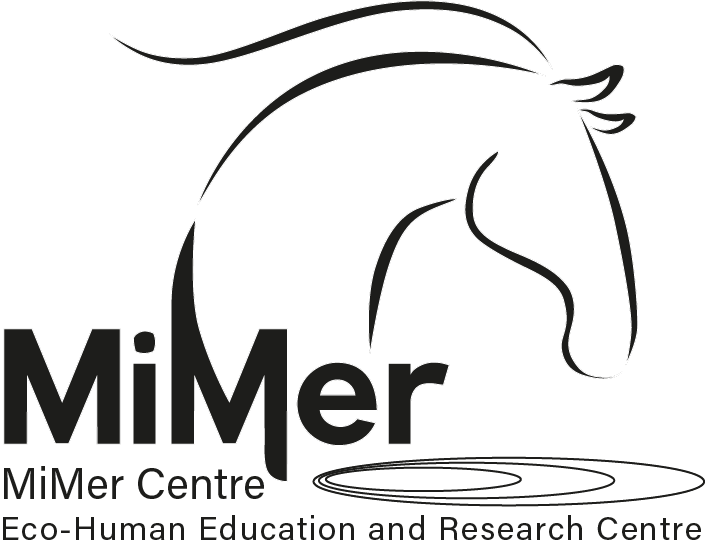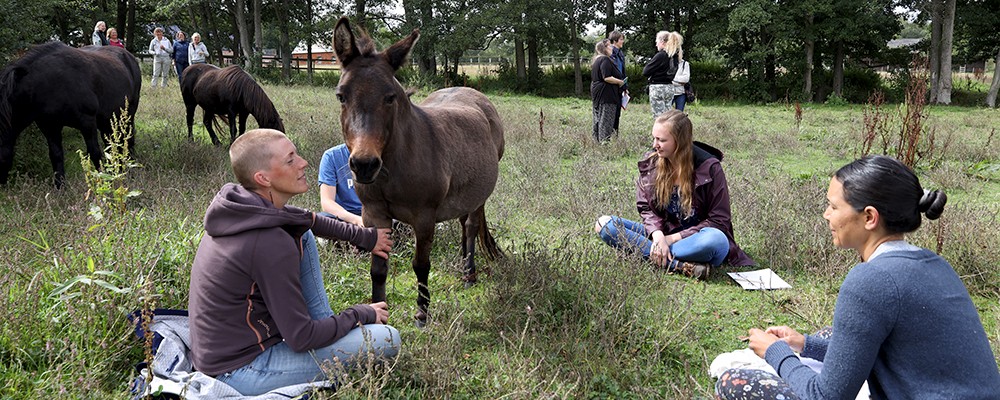THE AGENCY OF THE HORSE – AND THE AGENCY OF ME
I work in the field of EAMH/L, as a provider, educator, and researcher. I am deeply passionate about my work. Because I know it works (and have a gotten deeper understanding of how it works), from my own experiences in the role of the client in EAMH. I spend much of my time thinking about this work, how we can improve it, develop it, do research about it, raise the standards of the educations that are provided and so on.
What I see today are two major phalanges in our field. One that still to a smaller or greater extent still ignores or pay very little attention to horse welfare, from the horse’s perspective. The other phalange moves towards questions like, is it even okay to do any kind of equine assisted work? Client work, is perhaps hurting horses? (with a focus on emotional harm).
I listen to all kinds of perspectives and views. I try to the best of my ability to put myself in different people’s shoes. And I ask myself, how is it to see our field, from their point of view?
Nobody will ever know what it is to be a horse. It does not matter how long you study horse behavior, feel like a horse, how much you like horses, or how good you are at handling them or training them – none of us are horses.
Whatever standpoint we take, will come from our own beliefs, knowledge, culture, traditions, horse experiences, educations – and personal background. The more aware of who ware are, were we come from, and the more courage we have to look at that – the more we will know why we see horses the way we do, including their welfare.
To see (and understand) horses – two different areas of knowledge are crucial. That of horses, and that of yourself. And these two areas of knowledge are dependent on each other. Without the knowledge of horses, or a drive to acquire more knowledge about horses, what you usually do, what everyone else does, and what tradition tells you to do, often become your guides. Without knowledge about yourself, you will not see when what you know, or think you know about horses, is more about yourself, than horses.
I have a trauma background (hence the years in the client role in EAMH). When I started as a provider in this field, I knew a lot about horses, and since then, I have learned much more (and keep on learning). But what was even more important – I learned about myself. I learned why the agency of the horse matters so much to me, why his voice, choices, emotional, cognitive, social welfare (and needs) mattered so much to me, I learned about why looking into movement, rhythm and space, the connection between body and mind, doing and being, mattered so much to me. I learned about why I pay so much attention to the environment the horse lives in. To if he has a stable herd, if he is allowed to explore, learn, grown, be him and why all this mattered so much to me. I learned about why I am so sensitive to seeing horses being stressed, misunderstood, restricted, treated in a dominant way. I learned about why I struggle with ideas on dominance and submissiveness, hierarchies, leader mares and stallions. I learned about why I do not like to see stabled horses, why I do not like much of the equestrian tools used to ride (or drive) horses.
I can explain, defend all of the above, why much of what we traditionally do (or have done) with horses – is detrimental to both their physical and mental health and wellbeing. I have looked far into the science of it. I have explored animal welfare from the philosophy side. I know, from a science point of view, what it does to horses to keep them in too small spaces, without enough chances for slow continuous movement, a fibrous diet, without access to conspecifics, taking them to places, subjecting them to things they seldom get enough time to adjust to and learn about. I know the pros and cons of clicker training; I have studied domesticated horses and feral horses. I have even been to Mongolia and studied Przewalski horses and learned about horses from horse nomads and their wild horse researchers. I still feel a strong need to learn more. That too is a big passion of mine. To get to know horses and their world.
But…. Did I do all this – did all this – make me a better person? A truer horse person? Better at seeing horses? A better advocate for horse welfare. Perhaps. It has contributed.
But also no. It all of course also have to do with me. With who I am. What I have experienced in life. It was not just for the horse. It was a proxy. A way for me to express my own story, my own needs. I did not dare to speak up for myself, so I spoke up for horses instead.
When I grew up, I did not have agency, I had no voice, no choices. I was abused, neglected, moved all the time (therefor lacking any kind of stability) – ended up with the mental health care and social welfare systems which kept on pretty much doing the same things – but calling it treatment and help instead (and while there were some sexual harassments I was not sexually abused within those systems).
The ones working in these systems of course often also had other intentions with what they did. But do to me – they did, without giving me a voice, choice, or agency. And I could not ask for it – because I did neither any concepts, nor words for it. And on top of it I kept on being misdiagnosed – and staying an enigma to most treatment people, being trauma informed was not a thing back then.
I left those worlds and found my way out into the countryside, and I let my interest in nature and animals, and specifically horses take up more and more of my time. I started a livery yard, a small riding school, with camps, a held, offered, and hosted clinics. I offered horse and riding vacations, and so on. Then I entered the EAMH/L world. I thought I would find more horse welfare there, more open discussions. That was not what I found, so I found myself becoming a horse welfare advocate.
So, what motivated me to speak up on more knowledge about horses in our field, or in the horse world at large? About better welfare? About seeing the hose as a subject? Advocating for his agency? Saying behavior is language? Keep pointing out that behaviors are context dependent? That horses have social, emotional, and cognitive needs? Besides the also so important, but more purely biological needs? (even if they are connected of course).
When I figured out how much that had to do with my own personal story – and that took some time – I stood back a bit, wanting to see if my interest in horses and horse welfare would diminish. It did not. But I see it differently now. And I keep staying aware of my motivation to do things, to advocate for change. And I have started to advocate for “human welfare” as well. And to speak up about my own story.
When I see a horse in distress, where the owner/handler do not see what I see – I need to keep this in mind. Ask myself about my discomfort. Remind myself that horses are different than humans. They certainly do not deserve to live a life in distress, but if I judge what I see, which is just, often one situation (I live in at a horse veterinarian facility – I see, and hear, a lot of horses in distress) – I can be of no help to anyone, including myself. Horses are not humans. What they experience is not connected to our human concepts of the world. I need to stay aware of this difference.
When I work in EAMH/L – I need to remember myself. When I educate, I need to stay aware. When I do research, I need to openly listen and take in. None of those situations are about me.
When I see and hear things, I need to stay non-judging. I see what I must do as a constant balancing between what I know about horses, what I know about facilitating growth, what I know about myself and why people come to me for growth (education or research collaborations) – leave any of it out – and someone will suffer, or all of us.
This is why I have a hard time talking about equine welfare without bringing up human lenses and perspectives. This is why it is hard to talk about the need of more horse knowledge without talking about providers need for personal growth.
I have learned why the hard way. What I knew cognitively have landed in me emotionally. But… if I forget for one moment where I come from, who I am, I will slip up. Maybe it will become second nature. It isn’t yet (so if you find yourself tired of me talking about my trauma background and my experiences as a client in EAMH – you know I also do it for me. It is an openness I need.)
In our field (and other horse industries) I keep hearing – all over – what horses are saying, why they are doing this or that, how we can communicate with them more like horses ourselves – I keep on hearing a lot of interpretations. A lot of people voicing horses in different ways. But who are we really voicing when we do that?
What about your own agency? Your own voice? Your own choices? What about your own stress levels? Your own living conditions? Your own need for better food and more movement? Your own need for more close relations?
Without honestly looking at ourselves – no amount of knowledge about horses and their welfare will help.
Still I say – no ones EAMH/L services will ever be better than the welfare they provide their horses.
Complex – Huh??? Yup. We as an industry stand and fall with the welfare we provide our horses, but we will not recognize who the horse is and what welfare he needs – if we cannot see ourselves, our own need for welfare, our own need to have a voice, have choices and have agency.
Text and picture are copyright protected © Katarina Lundgren 2021
When you subscribe to the blog, we will send you an e-mail when there are new updates on the site so you wouldn't miss them.


Comments 1
I really enjoyed this piece. I do agree that if we are limited in our knowledge and awareness of horse or people welfare then we cannot help people to the best of our ability. I also agree we need to bring whatever area is lacking in knowledge (horses, ourselves, environment, client etc ) in balance otherwise further progress cannot be achieved. I suppose the task is bringing awareness of the importance of this to the wider audience. Your quote
'Still I say – no ones EAMH/L services will ever be better than the welfare they provide their horses'
speaks to me of an 'holistic' approach that has knock on effect either directly (client sees empathy for all living things) or indirectly (horses need met means they are 'happy' and better able to connect)